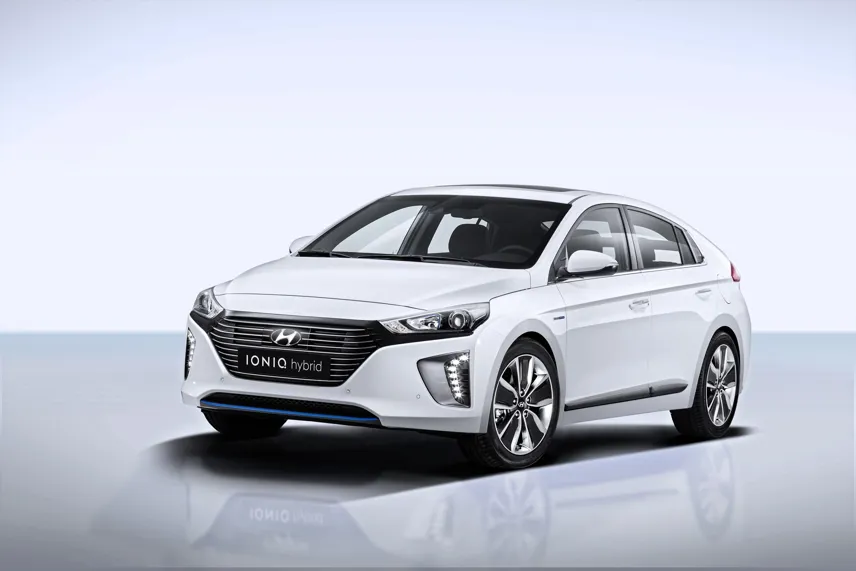Review
It’s unlikely that anyone procuring cars now doubts the ability of Hyundai (and Kia) to compete with some of the biggest manufacturers on the world stage.
Last year the company introduced the first mass-production hydrogen fuel cell car to the UK, the ix35 FCV, and soon it will be leapfrogging a number of big players by offering an affordable hybrid, electric car and plug-in hybrid. The latter will arrive in 2017, but the EV and Hybrid will be available in the autumn, with orders now being taken.
The unique proposition for these three alternative fuel powertrains is that they are each contained within a common body architecture.
The Hyundai Ioniq is a lower-medium hatchback, not dissimilar in design to the now discontinued Vauxhall Ampera. However, the Ioniq offers seating for five adults and a pretty generous luggage compartment.
For the Hybrid the entry-level SE, priced at £19,995 on the road, comes with 15-inch alloy wheels (essential for the lowest 79g/km rating), DAB with Bluetooth, cruise control, rear parking sensors with rear-view camera, autonomous emergency braking and lane-keeping assistance.
The Premium grade is priced £1,800 higher and adds keyless entry and push-button start, heated front seats and steering wheel, bi-xenon headlamps, LED rear lights, LCD instrument display sat-nav with TomTom Live services, and upgraded audio with Android Auto and Apple CarPlay compatibility.
The range-topping Premium SE, at a further £1,800, adds a ventilation function to the front seats, heated outer rear seats, electrically adjustable driver’s seat, blind spot monitoring, rear cross traffic alert and front parking assistance. Optional 17-inch alloys are available. CO2 emissions are pushed to 92g/km and fuel economy on the combined cycle is cut to to 72.4mpg (83.1mpg on standard wheels).
We’ve become used to hybrid models during the last 16 years and they now hold few surprises.
Cars such as the Toyota Prius have been chosen as more tax-efficient alternatives to diesels, as well as a more practical vehicle for urban use.
The Ioniq Hybrid does all that we expect a modern hybrid to do. At low speeds it runs only on the electric motor provided there is sufficient charge left in the lithium ion battery.
Its 1.6-litre petrol engine runs on the more efficient ‘Atkinson cycle’, like Toyota hybrids, and it also matches the thermal efficiency of the latest Prius.
Unlike many hybrids to date, the Ioniq comes with a dual-clutch transmission, offering the convenience and smoothness of an automatic without some of the noise issues associated with CVT systems, where initial rpm under acceleration is high.
Author:
Simon Harris
Specs
| Manufacturer | Hyundai |
| Model | IONIQ |
| Specification | IONIQ Hatch 5Dr 1.6h-GDi 141 SS €6 Premium SE DCT Auto6 16MY |
| Model Year | 0.00 |
| Annual VED (Road tax) | £0 |
| BIK List Price | £24,040 |
| CO2 | 79g/km |
| BIK Percentage | 17% |
| Insurance Group | N/A |
| CC | N/A |
| Fuel Type | Petrol Hybrid |
| Vehicle Type | Small family car |
| Luggage capacity (Seats up) | 5litres |
Running Costs
| P11D | £24,040 |
| Insurance group | N/A |
| Fuel Type | Petrol Hybrid |
| Cost per mile | 55.04ppm |
| Fuel | 6.08ppm |
| Depreciation | 47.20ppm |
| Service maintenance and repair | 1.76ppm |
Info at a glance
-
P11D Price
£24,040
-
MPG
83.1 -
CO2 Emissions
79g/km -
BIK %
17% -
Running cost
3 Year 60k : N/A 4 Year 80k : N/A -
Fuel Type
Petrol Hybrid
















